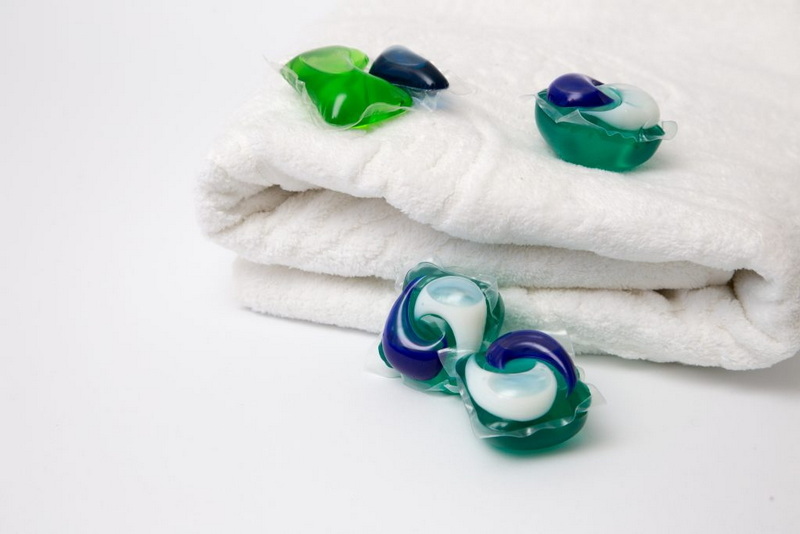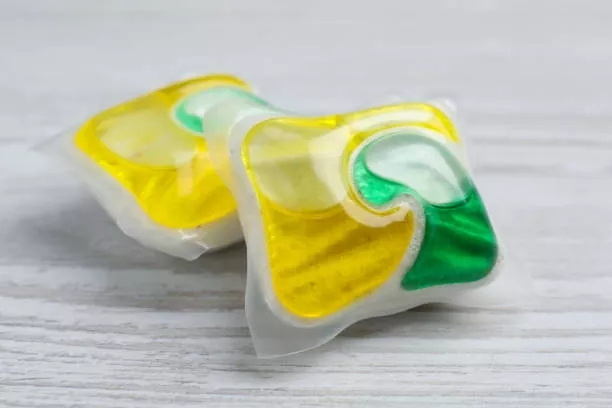Dongguan UFine Daily Chemical Co.,Ltd.
- All
- Product Name
- Product Keyword
- Product Model
- Product Summary
- Product Description
- Multi Field Search
Views: 222 Author: Tomorrow Publish Time: 11-10-2025 Origin: Site











Content Menu
● What Are Dishwasher Soap Pods?
● How Dishwasher Soap Pods Can Cause Eye Irritation
● Common Symptoms of Eye Irritation
● What to Do If You Experience Eye Irritation
● Preventing Eye Irritation from Dishwasher Soap Pods
● Are Dishwasher Soap Pods Safe?
● Alternatives to Dishwasher Soap Pods
● The Role of Manufacturers and Regulations
● Occupational and Household Implications
● Personal Experiences and Testimonials
● Practical Tips for Safer Use
>> 1. Can dishwasher soap pods cause permanent eye damage?
>> 2. What should I do if I get dishwasher soap pod solution in my eyes?
>> 3. Are there safer alternatives to dishwasher soap pods?
>> 4. How can I prevent eye irritation from dishwasher soap pods?
>> 5. Are dishwasher soap pods regulated for safety?
Dishwasher soap pods have become a popular choice for households around the world due to their convenience and effectiveness. These small, pre-measured packets contain concentrated cleaning agents designed to dissolve quickly in water, making dishwashing easier and more efficient. However, as their use has increased, so have concerns about their safety—particularly regarding eye irritation. Many users have reported experiencing burning sensations in their eyes after exposure to dishwasher soap pods, raising questions about whether these products are truly safe for everyday use.
This article explores the connection between dishwasher soap pods and eye irritation, examining the ingredients, potential risks, and safety measures. We will also discuss what to do if you experience eye discomfort after exposure and how to prevent future incidents. The goal is to provide practical, evidence-based guidance for consumers, caregivers, and professionals who handle these products in homes, kitchens, and commercial settings.

Dishwasher soap pods are single-use packets that contain a combination of cleaning agents, enzymes, and other chemicals designed to clean dishes in a dishwasher. They are typically made from a water-soluble film that dissolves when exposed to water, releasing the cleaning solution inside. The main ingredients in dishwasher soap pods include:
- Surfactants: These help break down grease and food particles.
- Enzymes: These break down proteins and starches found in food residue.
- Bleach: This helps remove stains and sanitize dishes.
- Alkaline builders: These increase the pH of the water, enhancing cleaning power.
- Fragrances and dyes: These are added for scent and appearance.
In addition to these core components, some pods may include corrosion inhibitors to protect the dishwasher's metal components, antiredeposit agents to prevent mineral buildup, and enzymes tailored to different types of food soils. The exact formulation varies by brand and product line, which means exposure risk can differ between products.
While these ingredients are effective at cleaning dishes, they can also be harsh on the skin and eyes, especially if the pod is not handled properly. The protective film around pods is designed to prevent accidental leakage under normal use, but ruptured pods or broken containers can release concentrated contents unexpectedly.
Eye irritation from dishwasher soap pods is usually caused by direct contact with the concentrated cleaning solution inside the pod. If a pod is punctured, crushed, or mishandled, the chemicals can leak out and come into contact with the eyes. The high alkalinity of the solution, combined with the presence of surfactants and bleach, can cause a burning sensation, redness, and even temporary vision problems.
Repeated or prolonged exposure can increase the risk of more pronounced symptoms, including corneal irritation or chemical conjunctivitis. Individuals with sensitive eyes, contact lens wearers, or those with pre-existing ocular conditions may experience stronger reactions. Children, who may be more likely to mishandle pods, are a particularly vulnerable demographic.
The severity of the irritation depends on several factors, including the concentration of the chemicals, the duration of exposure, and the individual's sensitivity. In some cases, the irritation may be mild and resolve on its own, while in others, it may require medical attention. Chronic exposure in occupational settings can contribute to cumulative eye surface damage, underscoring the importance of proper handling and storage.
If you experience eye irritation after exposure to dishwasher soap pods, you may notice one or more of the following symptoms:
- Burning or stinging sensation in the eyes
- Redness and swelling
- Excessive tearing
- Blurred vision
- Sensitivity to light
- Feeling of something in the eye
- Temporary decreased ability to focus
Most symptoms appear soon after exposure and improve with prompt irrigation. Delayed onset is uncommon but possible if the eye surface becomes irritated or if a secondary infection develops.
If you suspect that dishwasher soap pods have caused your eyes to burn, it is important to act quickly to minimize the risk of further damage. Here are the steps you should take:
1. Rinse your eyes immediately: Use clean, lukewarm water to flush out the irritant. Hold your eyelids open and let the water flow over your eyes for at least 15 minutes. If available, use an in-bath eyewash station or a gentle saline solution.
2. Remove contact lenses: If you wear contact lenses, remove them before rinsing your eyes to ensure a thorough flush.
3. Do not rub your eyes: Rubbing can worsen irritation and potentially cause corneal abrasion.
4. Seek medical attention: If irritation persists, worsens, or is accompanied by severe pain, vision changes, or swelling, seek medical help immediately. An ophthalmologist may perform a slit-lamp examination to assess corneal integrity.
5. Monitor for secondary symptoms: If you experience persistent tearing, discharge, or headaches, consult a healthcare professional to rule out infection or more serious injury.
For caregivers and parents, it is important to keep windows open for ventilation if you were handling pods in a kitchen or laundry area to minimize inhalation exposure, though inhalation of the powder or mist is less common than direct contact.

Prevention is key when it comes to avoiding eye irritation from dishwasher soap pods. Here are some tips to help you stay safe:
- Store pods out of reach of children and pets: Keep them in a secure cabinet or drawer with a child-resistant latch if possible.
- Handle pods with dry hands: Wet hands can cause the pod to dissolve prematurely, increasing the risk of exposure. Avoid handling multiple pods in one hand.
- Do not puncture or crush pods: This can release the concentrated cleaning solution. Teach household members about safe handling.
- Wash your hands after handling pods: This helps remove any residual chemicals before touching the face or eyes.
- Use gloves if you have sensitive skin: This provides an extra layer of protection against accidental contact.
- Use the dishwasher in a well-ventilated area: While not a primary exposure route, good ventilation reduces inhalation of any fumes or highly volatile components.
- Follow manufacturer directions: Use the exact amount recommended and avoid stacking pods.
Dishwasher soap pods are generally safe when used as directed. However, their concentrated nature means they can be dangerous if mishandled. The risk of eye irritation is real, but it can be minimized by following proper safety precautions. If you have concerns about the safety of dishwasher soap pods, consider using alternative cleaning products or consulting with a healthcare professional.
If you are concerned about the potential risks of dishwasher soap pods, there are several alternatives you can consider:
- Liquid dishwasher detergent: This is less concentrated and may be less likely to cause irritation.
- Powdered dishwasher detergent: This is also less concentrated and can be measured out as needed.
- Eco-friendly dishwasher detergents: These are designed to be gentler on the skin and eyes.
- Tablet detergents: Some brands offer tablet forms that may have different formulation profiles.
Manufacturers have a responsibility to ensure that their products are safe for consumers. This includes providing clear instructions for use, proper labeling, and safety warnings. Regulatory agencies also play a role in monitoring the safety of dishwasher soap pods and other household cleaning products. If you have concerns about a specific product, you can report it to the relevant regulatory agency. In many regions, there are also standards for packaging to minimize accidental exposure, such as child-resistant closures and clear hazard warnings.
For household users, the risk is primarily accidental exposure. In workplaces such as restaurants or commercial cleaning operations, skin and eye exposure can be more frequent due to handling multiple pods, spills, and rapid cleanup tasks. Employers should implement safety protocols, including personal protective equipment (PPE) like gloves and protective eyewear, spill response kits, and training on first aid procedures for exposure.
Many people have shared their experiences with dishwasher soap pods and eye irritation online. Some have reported mild discomfort that resolved quickly, while others have experienced more severe symptoms that required medical attention. Reading these testimonials can provide valuable insights into the potential risks and how to handle them. Narratives often highlight the importance of prompt response, proper storage, and the variability of reactions among individuals.
Healthcare professionals and safety experts emphasize the importance of precaution when using dishwasher soap pods. They stress the need for proper storage, handling, and immediate action if exposure occurs. They also advise seeking medical attention if symptoms persist or worsen. Researchers continue to study the irritant properties of common cleaning agents to better understand dose-response relationships and to improve product safety.
- Keep pods in their original packaging until use to avoid confusion with other household items.
- Check the pod film integrity before placement in the dishwasher; discard any compromised pods.
- Consider using dishwasher detergents with lower allergen and fragrance content if you have sensitive eyes.
- RegularlyInspect dishwasher seals and interior for residues that could mix with detergents and heighten irritation risk.
- Educate children about the dangers of ingesting or mishandling cleaning products, even at the pod level.
Dishwasher soap pods offer a convenient and effective means of cleaning dishes but carry a tangible risk of eye irritation if mishandled. The concentrated nature of the active ingredients can cause burning, redness, and other symptoms when in direct contact with the eyes. By understanding the ingredients, recognizing early symptoms, acting quickly, and adhering to safe handling practices, users can minimize risk and keep eyes safe during routine cleaning tasks.

In most cases, exposure to dishwasher soap pods causes temporary irritation that resolves with proper treatment. However, severe or prolonged exposure can potentially lead to more serious eye damage, so it is important to seek medical attention if symptoms persist or worsen.
Rinse your eyes immediately with clean, lukewarm water for at least 15 minutes. Remove contact lenses if you wear them, and seek medical attention if the irritation persists or worsens.
Yes, liquid and powdered dishwasher detergents are less concentrated and may be less likely to cause irritation. Eco-friendly detergents are also available and are designed to be gentler on the skin and eyes.
Store pods out of reach of children and pets, handle them with dry hands, do not puncture or crush them, wash your hands after handling, and use gloves if you have sensitive skin.
Yes, dishwasher soap pods are regulated by agencies that monitor the safety of household cleaning products. Manufacturers are required to provide clear instructions, proper labeling, and safety warnings.